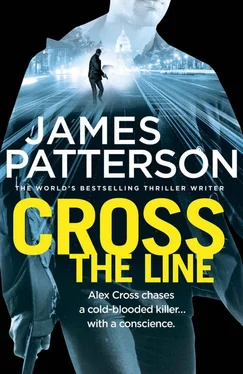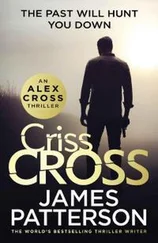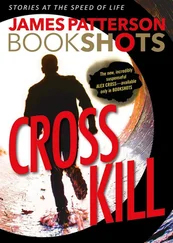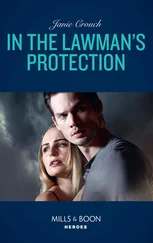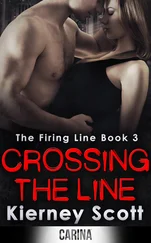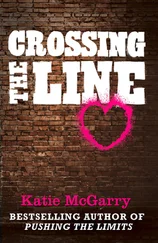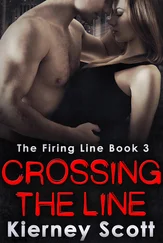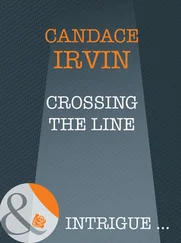In my line of work, where I’m often bombarded by details and exposed to the worst of life, I have to clear my mind completely at least once a day. Otherwise, it all gets to be stressful chatter upstairs, an endless series of questions, theories, arguments, painful memories, and regrets. It can get overwhelming.
I was feeling even better by the time I reached the grocery and went inside. Chung’s was frigid, like always.
“Alex Cross, where you been, my man?” cried a woman behind the counter. “I was waiting on you or Nana Mama all day yesterday.”
Chung Sun Chung, a Korean American in her late thirties, sat framed in an arched hole in a plate of bulletproof glass. Sun, as she liked to be called, wore a puffy coat and fingerless mittens. She managed to keep an electronic cigarette in the corner of her mouth while smiling broadly at me.
I walked over to her. “We’ve both been busy.”
“How’s Damon like college?”
“Loves it.”
“I saw your Jannie on the YouTube.”
“Crazy, right?”
“She’s gonna be famous, that one. How many chances will Nana Mama be taking at an unlimited future today?”
“That’s your line?”
“Good one, huh?” She beamed and drew on her e-cigarette.
“Give her ten chances each on Powerball and Mega Millions,” I said, laying down the cash.
My grandmother played only the big-money lotteries. If you’re going to dream, you might as well dream big, she liked to say.
“Same number?” Sun asked.
“Sure. Wait! You know what? Let’s change it up. Five each on her numbers and for the rest, add a one to the last number.”
Sun glanced at me. “Nana Mama’s not going to like that.”
“She won’t even look,” I said.
“You like taking your life in your hands?”
We both laughed. We were still laughing as I left.
On my way home to dinner with my family, I decided there were still good people in the world, very good people, like Chung Sun Chung. I guess I’d needed reminding of that after the past couple of weeks I’d had.
The cumulative violence and bloodshed inflicted by the vigilantes was sobering when I thought about it. Climbing the steps to my front porch and smelling a pie Nana Mama had baked, I couldn’t shake the feeling that the violence wasn’t over, that Hobbes and Fender and the other vigilantes were somehow just getting started.
John Brown sat forward in a chair, his eyes glued to the big-screen TV, where an NBC news reporter was standing in front of Antonin Guryev’s compound.
“This is the fourth such massacre in less than a month,” she was saying. “Up to now, the killers have left little evidence behind. But FBI special agent in charge Ned Mahoney says that has changed. Mistakes were made.”
Low voices rumbled through the room behind Brown. Many of his followers were looking at one another.
“Mistakes?” Hobbes said, putting down his beer. “No way.”
“Why don’t you shut up and listen,” Cass said, pacing and watching the screen. The scene jumped to Mahoney standing before a bank of microphones.
“We are confirming seventeen dead,” Mahoney said gravely. “We are also confirming that we have a witness, a survivor who saw many of the killings on security cameras in a secret panic room in the basement of the house. This witness got solid looks at two of the killers when they took off their hoods.”
“Secret panic room!” Fender said. “And who the hell took off their hoods?”
“I did,” Hobbes said. “It was frickin’ hot and I had the security hard drive.”
“Who else broke protocol?” Brown roared.
Cass, looking stricken, said, “I did. It was hot and I... I thought we were good. And my hair was different. And my eyes that night.”
On the screen, reporters were yelling questions at Mahoney. Who was the witness? Could the witness identify the killers?
“We’re not identifying the witness for the time being,” Mahoney said. “We believe the witness can identify the killers. We’ll have more for you tomorrow.”
The screen cut back to the standup reporter, who said, “The FBI seems confident that this is the break they needed to at last bring the vigilantes to justice.”
Fender stared at Hobbes. Brown stared at Cass, who looked devastated.
“This is bullshit,” Hobbes said, grabbing the remote and punching off the TV. “What are they going to get from the witness? At best, an artist’s sketch.”
Brown was about to explode, but then his burn phone began to buzz.
He answered, said, “You saw it?”
“Of course, I fucking saw it,” the man on the other end of the line snapped. “The witness is Guryev’s wife.”
“That’s not good,” Brown said.
“No, it goddamned isn’t. Our ship has a hole. You need to plug it.”
Brown flushed with anger. “How the hell am I supposed to do that?”
“I have her location and a way inside.”
“Attack an FBI safe house?” Brown said. “I don’t know if that’s such a—”
“You want to take this to the next level or not?”
The next level. Brown felt all doubt leave him then, and said, “You know it’s the only long-term solution. If we don’t, nothing we’ve done will really matter.”
“Exactly. So steel yourself and get rid of Elena Guryev.”
At eight thirty the morning after the massacre, Ned Mahoney and I sprinted down Monroe Street in Columbia Heights. Patrol cars and an ambulance blocked the street, their lights flashing.
We showed our badges. The patrol officer pointed at the open door of a town house. The call had come into 911 only twenty minutes before. I’d been on my way to work and came straight over. Mahoney had been heading to FBI headquarters, heard about the call, and came straight over as well.
After putting on gloves and booties, we stepped inside and saw a dead man lying facedown in the entryway, another one beyond him.
“Simms and Frawley,” Mahoney said angrily. “Good agents. Seasoned agents.”
“Shot in the back,” I said.
“They were replacing the night team,” Mahoney said. “The killers must have come in right behind them.”
The locations of federal safe houses are some of the most secure and heavily guarded secrets in law enforcement, so it was understood that the killers had had inside intelligence. Mahoney had a traitor in his midst, and we both knew it.
We stepped over and around the dead agents, passed a television room on our left where the carpet was smeared with blood, and went into the kitchen, where a third FBI agent lay dead. Two EMTs worked on a fourth man, George Potter, the DEA’s acting special agent for the Washington, DC, office.
Potter’s face was covered with blood from a nasty wound to his scalp. His shirt was off, and there was a clotting patch pressed into a chest wound. The medics had him hooked up to IVs and oxygen.
“How is he?” Mahoney asked the EMT.
Potter opened his eyes and said, gasping, “I’ll live.”
“How is he?” Mahoney asked again.
The EMT said, “Took a slug through his right lung, and he has a hell of a gash on his head. But he’s lucky. He’ll live.”
“What happened?” I asked.
“We need to get him to the hospital,” the medic said.
“Wait, they need to know,” Potter said, looking at me. “Ned asked me to come in with the replacements and start talking to Mrs. Guryev first thing.”
I glanced at Mahoney, who nodded.
“Everything looked fine coming through the door,” Potter said. “I was walking down the hall with Simms and Frawley behind me. Out of nowhere there were sound-suppressed shots. Three of them. Fast. I got hit by the third shot. Spun me into that TV room. Went down, hit my head on the coffee table. When I came to, I called 911. What’s happened? Has anyone gone upstairs to see?”
Читать дальше
